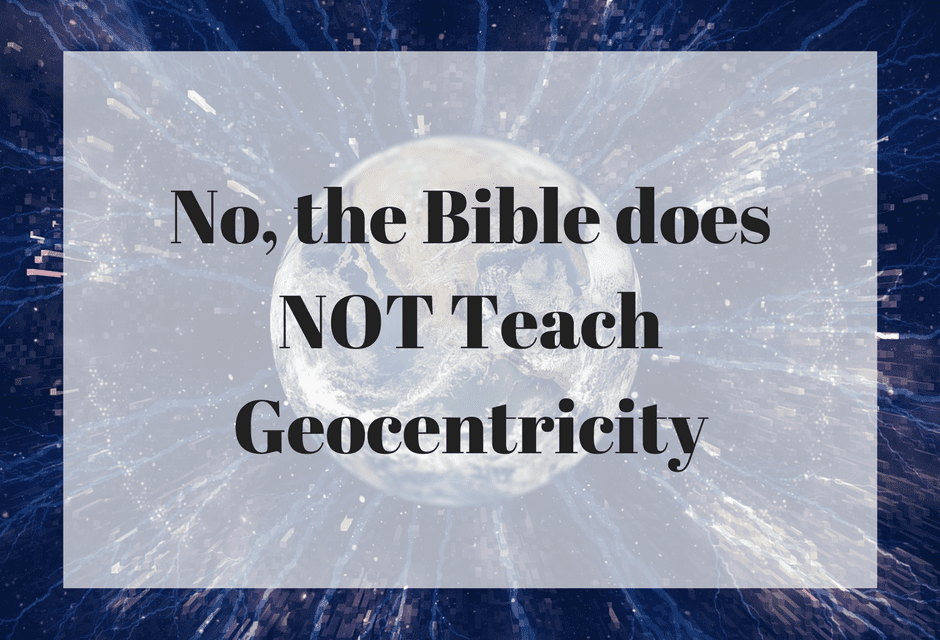Those of us who claim to hold to a natural interpretation of God’s Word can expect to face certain criticism.
The fact is that many aim to downplay the historical veracity of the Bible in an attempt to make believing in its truth seem either more convenient, or wholly irrational.
As a consequence, critics like to pull specific teachings out of their proper context and attempt to demonstrate how holding to a natural interpretation would necessitate subscribing to views that, almost certainly, Bible-believers do not.
Geocentrism is one such example.
It would behoove you to understand the history behind this objection, the false accusation of “hyper-literalism,” the biblical precedent for understanding this issue in context, and a more thoughtful approach for understanding the Bible as a whole.
A Brief History
While popular belief holds that biblical teaching caused many to erroneously conclude that we lived in a geocentric solar system, nothing could be further from the truth.
In a 2001 paper, Faulkner helpfully demystifies the convoluted (and incorrect) claim that geocentrism was a view invented by the church, in accordance with what they read in the Bible:
In the middle ages and well into the Renaissance, the Roman Catholic Church did teach geocentrism, but was that based upon the Bible? The Church’s response to Galileo (1564–1642) was primarily from the works of Aristotle (384–322 BC) and other ancient Greek philosophers. It was Augustine (AD 354–430), Thomas Aquinas (1224–1274) and others who ‘baptized’ the work of these pagans and termed them ‘pre-Christian Christians’.
This mingling of pagan science and the Bible was a fundamental error for which the Church eventually paid a tremendous price. Confusion persists to today in that nearly every textbook that discusses the Galileo affair claims that it was a matter of religion vs science, when it actually was a matter of science vs science. Unfortunately, Church leaders interpreted certain Biblical passages as geocentric to bolster the argument for what science of the day was claiming.
This mistake is identical to those today who interpret the Bible to support things such as the big bang, billions of years, or biological evolution. Therefore, any evangelical Christian misinformed of this history who opines that the Bible is geocentric is hardly any more credible a source on this topic than an atheist or agnostic.
Dr. Faulkner herein makes an interesting point. When we begin to interpret the Bible in light of current scientific theorem, we at least risk tragically undermining the teachings of God’s Word.
The reality is that we know far less about the human body than we thought. Just this year, a new human organ was discovered that scientists are calling the “interstitium.” And guess what?
They say it could be the largest organ in your entire body.
For all that we do know about the human body, we’ve just now learned about what could possibly be its largest organ, which in turn may even help us to understand more about how cancer spreads.
When you begin tallying up the unanswered questions for naturalistic scientists—e.g, how the universe was actually formed, how life arose from non-life, how massive jumps in the organismal record could have taken place without any intelligent guidance, how irreducibly complex organisms developed without being wiped out by natural selection, etc.—it becomes clear that to interpret the eternal Word of God according to our current “knowledge” would be an egregious error.
That said, I am sympathetic to the argument in one sense. I can see how one could take such passages (as will be considered later) and interpret them in such as a way as to attempt a rescue of the current scientific consensus.
Thus, in no way do I mean to argue that if I had been living at that time I would be an exception to the rule (although I’d like to think I would); rather, I aim to demonstrate how this error should be a learning experience for Christians today, and offer some suggestions as to how we can avoid this in the future.
Wooden Hyper-literalism?
I’d be remiss to move much further without first clearing away this massive obstacle that seems to plague young age creationists.
In a recent podcast episode, I spent almost an hour analyzing a recent debate and nailing down the proper interpretation of the word literal. If you’ll notice, I prefaced this post using the term “natural interpretation,” which I advocate for in the podcast.
Here’s why: By “literal,” creationists really mean natural, straightforward, actual history, according to a historical-grammatical hermeneutic. We strive to understand authorial intent/meaning; not to press the text according to a presupposed outcome.
Now—this is not an area where creationists are “redefining” terms. In literary studies (and everyday language) it is perfectly acceptable to use non-literal verbiage in a context where the writer/speaker intends to convey literal meaning.
For example, in a conversation about your son’s soccer game this past Saturday, you might have told your buddy that your son’s team obliterated their opponents.
Of course, this is hyperbole. You are speaking in a very literal context about real events that happened, there may even be proper nouns involved (such the name of your son, his team, etc.), and you naturally inserted a hyperbole (intentional, figurative exaggeration) for effect, without for a moment thinking that your buddy would not have understood.
Your buddy does not take you to mean that your son’s team literally obliterated the opposition with AK-47’s, rather, he takes you to mean that they had a much higher score than the other team, and therefore, won the game by a wide margin.
For all intents and purposes, you would have been understood to be speaking in a narrative sense, and you would, in turn, expect to be taken literally.
This is how creationists interpret the Bible. This is also how other biblical writers—and Jesus Himself—interpreted the Bible.
Staff writer at Answers in Genesis, Simon Turpin, helpfully clarifies:
Biblical creationists interpret Genesis 1 using the historical-grammatical approach, which means taking the text plainly according to its literary genre. This approach understands Genesis 1 as historical narrative, which of course takes into account such things as metaphors and figures of speech (Genesis 2:23, 4:7, 7:11).
The plain meaning may be understood as “the meaning intended by the human author, as that sense can be plainly determined by the literary, and historical context.” Therefore because of the negative connotations associated with a “literal” interpretation of the Bible and Genesis 1, it is better to say “grammatical-historical interpretation.
In the above-mentioned podcast, I propose either using Turpin’s suggestion (grammatical-historical interpretation), or opting for a word such as “natural” or saying that you interpret according to “the author’s intended meaning.”
There’s lots more coming (and you can read it now at Steve Schramm.com)







